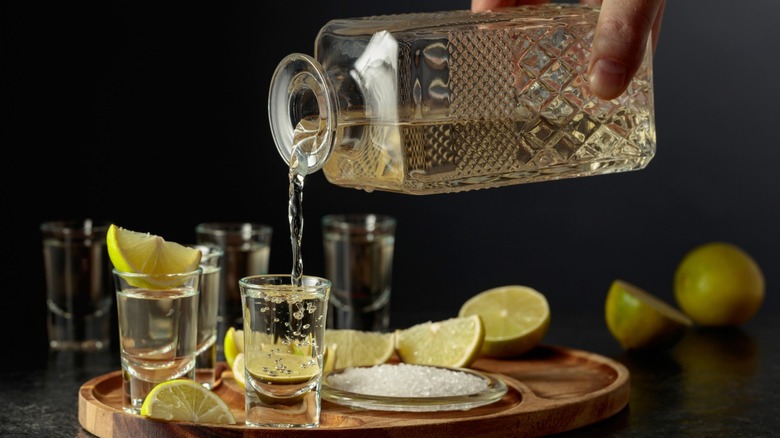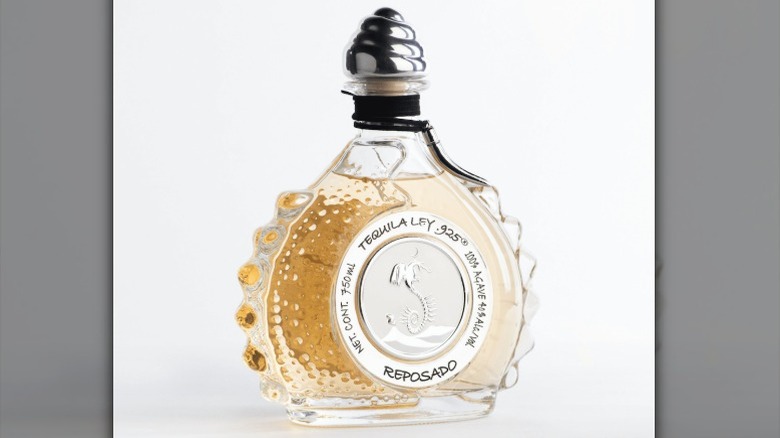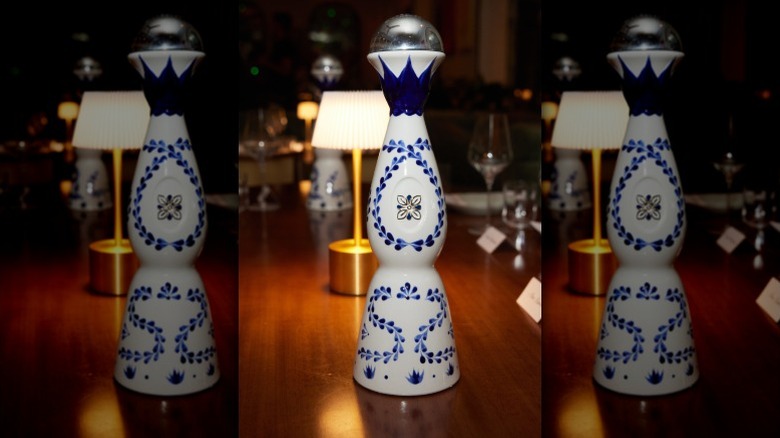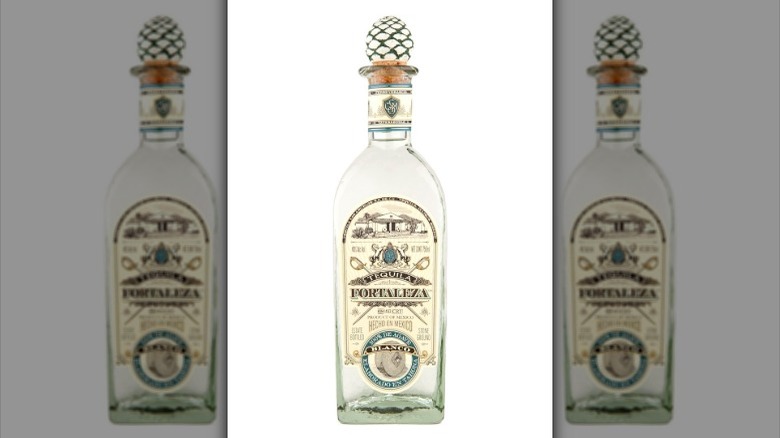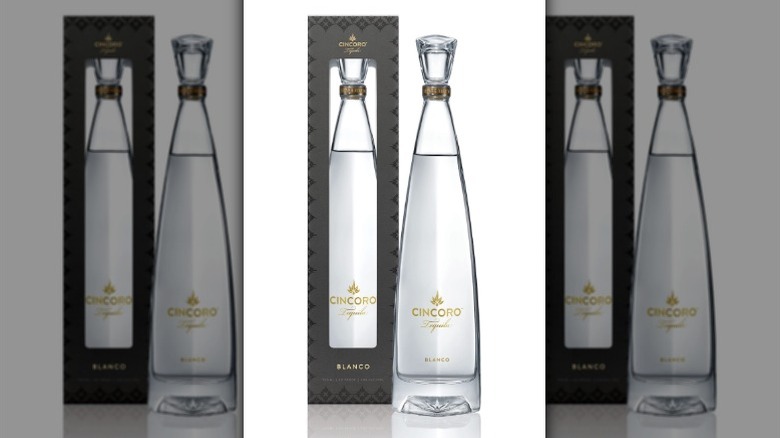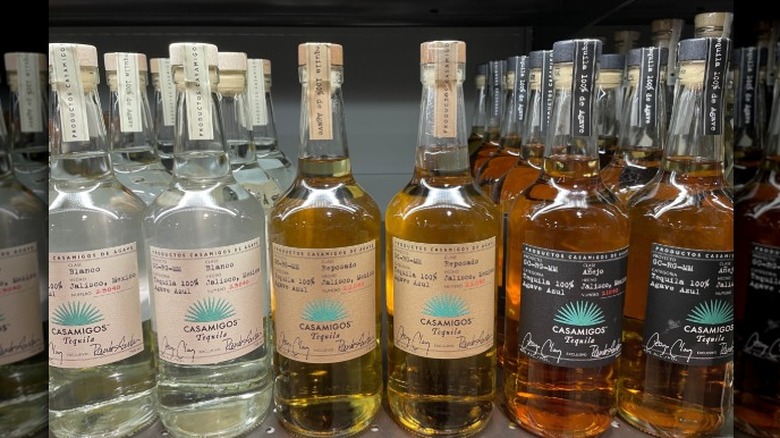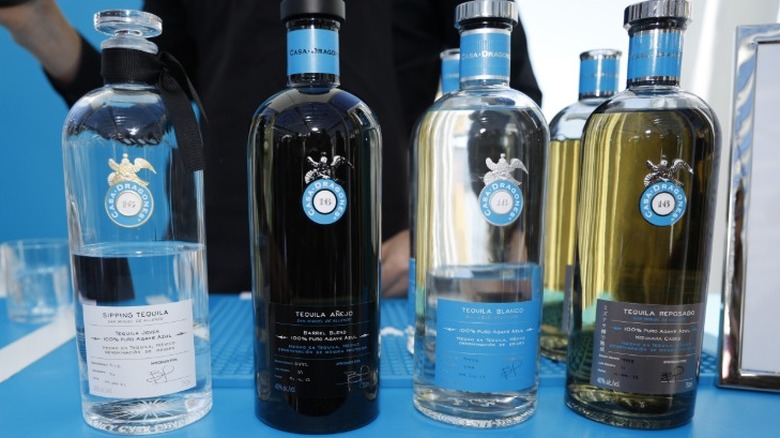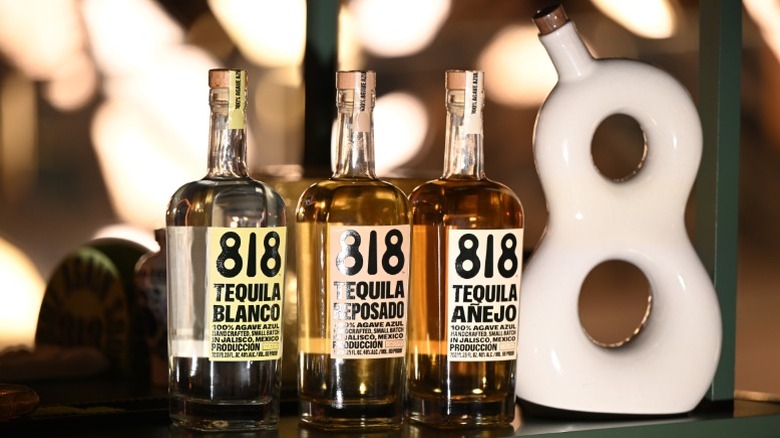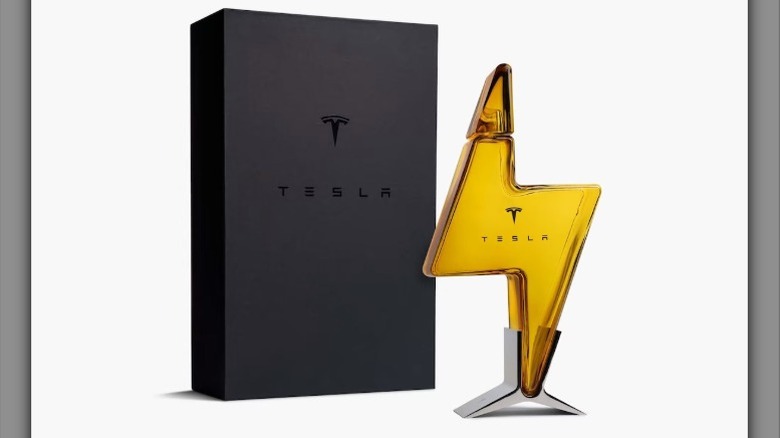8 Brands Of Tequila That Aren't Worth The Price
It's hard not to argue that we're living in anything but the golden age of tequila. The spirit's popularity has made it easier than ever to access truly complex and memorably delicious bottles, often at an accessible price point. While there's plenty of great value to be found in the tequila aisle, the geographic limitations, agricultural requirements, and overall artistry that go into making a truly nuanced spirit can sometimes justifiably drive up costs. But just like some of those expensive bourbons that aren't worth the price, part of the spike in notoriety has also brought out some options into the mix that do little more than drain your bank account for very little in return.
As a New York City bar owner and spirits tasting expert, I've had more than 15 years of experience tasting tequilas from across the price spectrum. While this field work has turned me into a die-hard agave fan, it's also made me painfully aware of products that remain relatively popular despite being wildly overpriced. And just to make sure I wasn't missing anything, I was able to chat with some hospitality industry colleagues who have even more agave expertise. If you want to avoid wasting your money, here are a few of the tequila brands you're better off skipping the next time you're out at the bar or shopping at the store.
1. Ley .925
In the liquor world, sometimes you can tell when something on the shelf or back bar is going to be on the pricier side just by looking at it. The Ley .925 lineup is just one of those examples, packaged in a beautifully squat, artistically designed bottle emblazoned with a dramatic medallion that looks more like a high-end decanter than anything else. In this case, judging the book by its cover would make you right: As a self-designated premium product, bottle prices for the brand range from $65 for blanco to $95 and above for aged varieties. However, there's really not much payoff for all that extra payout.
The unaged bottles of Ley .925, especially, lean heavily into a briney minerality that overpowers any other potential nuances before a short finish. Personally, I found the blanco to be so downright flinty that the one tasting note I circled back to was "wet cement." Even once you start shelling out even more for the reposado or añejo, there's a notable lack of complexity due to overpowering caramel flavors in both cases. For this much cash, you can do much better.
2. Clase Azul
Everyone who's been in a nightclub in the last decade has likely seen this uniquely decorated, tall, slender bottle pass on its way to a table of eager revelers. While it might not be one of the most popular tequila brands by outright sales volume, there is an undeniable hype that keeps drinkers coming back for more of this particularly pricey product.
Still, while it might earn you a few moments of attention at the bar, truly savvy drinkers will spend their money elsewhere. As always, the verdict here comes down to the expression of agave compared to other bottles on the shelf. The lineup overall is another one that trends toward being strangely sweet for this category, steamrolling any of the complexities that warrant a higher price point. Even though I was able to dig deep and pick up barely traceable hints of dried herbs and peppercorns, everything is steamrolled by a toffee-soaked oakiness that tastes several degrees higher than just barrel influence.
Ultimately, there are better agave spirits out there that won't cost you the $150 to $600 or more you can expect to pay in the store (and you don't even want to guess what bottle pricing goes for at bars) — even if it does come with a little bell for you to ring.
3. Fortaleza
Fortaleza is quickly becoming to tequila what Pappy Van Winkle has become for bourbon. The brand has skyrocketed in popularity and become scarce on the shelf, which has ballooned its price to dizzying heights for fans clamoring to get their hands on a bottle. The once $40 spirit is now $62 if you can get it, but stores can charge $80 to $100, or sometimes much more, for a bottle of the entry-level blanco. Naturally, the aged stuff can be much worse on your wallet.
According to Javier Reyes, agave expert and bar industry veteran, the brand is fairly overhyped in the U.S. He does admit that a lot of that comes down to it being made with traditional methods and smaller batch production that limits supply and drives up demand, along with great stateside marketing that has raised awareness. But while he (like me) says that Fortaleza is a "beautifully made tequila," it falls short of being a truly great example of agave excellence.
"If you blind taste Fortaleza next to other tequilas that are also made using traditional methods like Ocho, G4, or Cascahuín, it's hard to tell them apart because they're all that good," Reyes told me during a recent chat. "The big difference isn't quality, it's price."
4. Cincoro Tequila
In an increasingly competitive area like tequila, knowing a thing or two about high-level competition could arguably come in handy. Cincoro takes this concept to an entirely new level: The brand counts five NBA team owners (including Michael Jordan) as co-founders, who claim to have concocted the idea to launch the product over a dinner one night. In the alcoholic beverage world, the involvement of uber-wealthy owners with no discernible expertise with a product's background is something experts typically view as a massive red flag. In this case, that alarm bell appears to be fairly justified.
Running from around $60 for the blanco and up to $150 for añejo, and packaged in a sleek bottle, Cincoro is clearly positioned as a top-shelf product. But the brand also touts an extra añejo at a whopping $1,500, which it says spends more than 40 months in Tennessee whiskey barrels during aging. While I haven't been able to try this top-tier product, reviews roundly slam the pricey pour for its overly sweet and artificial taste, which certainly doesn't seem like the kind of tasting note you'd expect from such an expensive bottle. The brand's $250 Gold tequila suffers a similar fate, still showcasing an overwhelming sweetness and cream soda notes. Overall, this tequila is terrible value.
5. Casamigos
At this point, there are few products in the agave world that are as divisive as Casamigos. Not only is this product yet another example of celebrity alcohol endorsement gone full tilt, but most in the industry view it as a strange, overpriced fascination. I've said before that I find the products in the lineup as over-oaked as they are overpriced. In the worst cases, the bluntly sweet flavor profile tends to alienate true agave fans and beginners to tequila alike who are willing to splurge for nuance and complexity. Instead, here you're paying for a reductive flavor profile and a self-positioned premium status brought on by conspicuous celebrity endorsement.
Of course, celebrity involvement alone doesn't make this a bad product, but experts like Nate Serrano, bar manager at prestigious cocktail bar Hi-Note in New York City, say the clandestine manufacturing doesn't help things. "When seeking a true tequila, we look for brands that are transparent about their production process," he told me, "details such as agave maturity, terroir, pressing methods, distillation, and water source."
Instead, Serrano says that additives are often used as a shortcut to mimic authentic methods that can help tequilas shine. Instead, he suggests avoiding the hype and celebrity-induced price inflation and asking your local merchant for some home bar input, or your favorite bartender if you want to order tequila like a pro.
6. Casa Dragones
I'll admit that I had very high hopes going into my first sampling of the Casa Dragones lineup. Launched in 2009, it was slightly ahead of the flood of premium agave spirits to hit the market, and was technically the first with a female co-founder. In the decade and a half since, the brand has somehow failed to break into the limelight the way others in this price point were able to do so relatively quickly. But despite this, it hasn't stopped the brand from juicing the cost on what's ultimately an underwhelming spirit.
The straightforward lineup runs from $70 for blanco, $150 for their aged tequilas, and $250 to $350 for their joven "sipping tequila" (aka their cristalino offering). In my opinion, this is asking a lot, considering the flavor profile is overpowered by a pervasive sweetness. Strangely, this is even the case for the unaged tequila, which is typically a red flag for additives. Besides double-checking I wasn't drinking a flavored product, the only other notable elements I picked up during my tasting were a slightly medicinal finish that kicked in late on the palate, and a soft alcoholic burn on the finish that took me by surprise. In other words, it's relatively easy to find a replacement that's better value.
7. 818 Tequila
Not all celebrity tequilas come with eye-watering price tags: 818 is one entry-level-priced brand that has skyrocketed in popularity since Kendall Jenner signed on to endorse the brand in 2021. Since then, fans have eagerly scooped up bottles and ordered the spirit by name at bars (which some would argue serves as something of a warning sign for bartenders).
Even though the lineup typically ranges in price from $25 for blanco to $40 for añejo (as well as a hard-to-find reserve bottle that sells for just over $100), this is one spirit that's best left undrunk. I was lucky to be blind-tasting this the first time I tried it, and immediately questioned why what was in my glass tasted like a strange, mismatched blend of flavors cobbled together. Despite the fact that it tasted like it had been manipulated during the production process to be a crowd pleaser, the end result is an artificial flavor profile that boasts next to zero nuance or complexity. If you're trying to save money, do yourself a favor and explore the world of budget tequilas that are actually worth drinking instead.
8. Tesla Añejo Tequila
Drinking and driving are two things that should never go hand in hand. So when I first heard that electric vehicle manufacturer Tesla was planning on releasing its own lineup of agave spirits, I was fairly surprised. And then I saw the price tag.
Simply put, this reposado has all the trimmings of a gimmicky spirit without so much as a second glance. It starts with the unique lightning bolt-shaped bottle, which requires a special stand to stay propped up on your bar. But the truly eye-watering original price tag of $1,000 puts this añejo into the rarefied arena of spirits that charge a lot simply because they can (even the bottle can be purchased empty as a decanter for $250).
While it's no longer available directly from Tesla, second-hand sites are still selling bottles at the (very slightly) discounted price of $870. However, colleagues of mine who were able to sample a bottle at an event uniformly reported that the spirit itself tastes incredibly sweet on the palate with heavy-handed caramel notes. Unless you see value in it as a novelty collector item, you might want to take that money and put it towards a few cases of something that's worth drinking.
